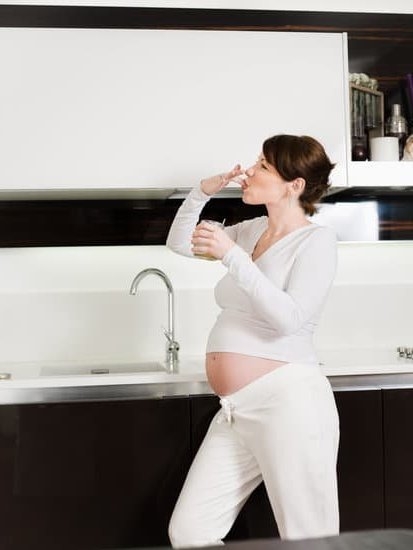Are you constantly rushing to the restroom more than usual? Wondering if this could be a sign of pregnancy? The question “Is peeing a lot a sign of pregnancy?” often crosses the minds of women who are trying to conceive or suspect they might be pregnant. Recognizing early signs of pregnancy is crucial for many expectant mothers as it can lead to timely prenatal care and support.
During pregnancy, hormonal changes play a significant role in affecting the kidneys and bladder function, leading to frequent urination. The increased blood flow to the pelvic area and pressure on the bladder can also contribute to this common symptom. Understanding the science behind why pregnant women experience frequent urination can help clarify whether this is indeed a sign of pregnancy or if there may be other underlying causes.
It’s important to differentiate between normal urination patterns in early pregnancy and excessive peeing that may indicate a potential pregnancy. While increased frequency is expected, signs of excessive urination combined with other symptoms could warrant taking a pregnancy test. Additionally, being aware of other possible causes such as urinary tract infections, diabetes, or overactive bladder syndrome is essential for proper diagnosis and treatment.
Understanding the Science Behind Frequent Urination in Pregnancy
During pregnancy, hormonal changes play a significant role in causing frequent urination. One of the key hormones involved is human chorionic gonadotropin (hCG), commonly known as the pregnancy hormone. This hormone increases blood flow to the pelvic area and kidneys, leading to increased urine production. Additionally, progesterone levels rise during pregnancy, causing relaxation of smooth muscle tissue throughout the body, including the bladder. This results in reduced bladder capacity and the need for more frequent trips to the bathroom.
The pressure exerted by the growing uterus on the bladder also contributes to the need for frequent urination in pregnant individuals. As the uterus expands to accommodate the growing fetus, it puts pressure on surrounding organs, including the bladder. This pressure can further reduce bladder capacity and increase the frequency of urination. In later stages of pregnancy, as the baby grows larger and moves lower into the pelvic area, this pressure on the bladder becomes even more pronounced.
It is important for pregnant individuals to differentiate between normal urination patterns and excessive peeing that may indicate a possible pregnancy. On average, women may experience an increase in urinary frequency as early as six to eight weeks into their pregnancy due to hormonal changes.
Signs of excessive urination that could be a sign of pregnancy include needing to visit the bathroom multiple times within a short period, particularly if this is a new development for an individual. If you are wondering “is peeing alot a sign of pregnancy,” it is essential to consider other symptoms you might be experiencing along with frequent urination before drawing any conclusions.
| Signs of Pregnancy | Description |
|---|---|
| Frequent Urination | Needing to use the bathroom more often than usual |
| Morning Sickness | Nausea or vomiting in early hours of day |
| Missed Period | Absence of regular menstrual cycle |
Differentiating Between Normal Urination and Excessive Peeing in Pregnancy
Frequent urination is a common symptom experienced by many pregnant women, but differentiating between normal urination and excessive peeing can be crucial in identifying early signs of pregnancy. During the early stages of pregnancy, hormonal changes play a significant role in increasing blood flow to the pelvic area, leading to increased pressure on the bladder. This physiological response often causes pregnant individuals to feel the need to urinate more frequently than usual.
On average, pregnant women may experience frequent urination as early as six to eight weeks into their pregnancy. The increase in urine production is attributed to hormonal fluctuations and the expanding uterus putting pressure on the bladder. However, if you find yourself running to the bathroom even more than what is considered typical for pregnancy or noticing other symptoms such as nausea, breast tenderness, or fatigue along with excessive peeing, it might be worth considering taking a pregnancy test.
Understanding the distinction between regular urination patterns during pregnancy and what could be classified as excessive peeing is essential for recognizing potential signs of pregnancy. While there are other reasons why someone may experience frequent urination – such as urinary tract infections (UTIs), diabetes, or overactive bladder syndrome – being attuned to your body and any unusual changes like sudden and persistent urges to pee can help you determine if indeed you are showing signs of being pregnant.
| Key Points | Details |
|---|---|
| Frequency of Urination in Early Pregnancy | About six to eight weeks gestation marks when frequent urination becomes noticeable due to hormonal changes. |
| Symptoms Differentiating Normal vs Excessive Peeing | Besides increased frequency alone, watching out for accompanying symptoms like nausea and fatigue can help identify signs of being pregnant. |
| Possible Causes Beyond Pregnancy | Factors like UTIs or diabetes should also be considered if unusual urinary habits persist apart from just being an indicator of pregnancy. |
Other Possible Causes of Frequent Urination
Frequent urination can be a common symptom experienced in early pregnancy, but it is not exclusive to this condition. Understanding the various potential causes of frequent urination is crucial in determining whether it may point to a pregnancy or another underlying issue. Here are some other possible reasons why someone may be peeing a lot:
- Urinary Tract Infections (UTIs): UTIs can lead to increased urinary frequency due to irritation and inflammation of the bladder. If you experience burning sensations while urinating or cloudy urine along with frequent bathroom trips, a UTI could be the culprit.
- Diabetes: Both type 1 and type 2 diabetes can cause excessive thirst and urination. For individuals with undiagnosed diabetes, frequent urination is often one of the first noticeable symptoms. If you have concerns about your blood sugar levels, consult with a healthcare provider for further evaluation.
- Overactive Bladder Syndrome: This condition involves a sudden urge to urinate frequently throughout the day and night. Overactive bladder syndrome can be triggered by various factors, including nerve damage, muscle problems, or infections. Seeking medical advice from a urologist or gynecologist is recommended for proper diagnosis and management.
Knowing the difference between normal pregnancy-related changes and abnormal urinary patterns can help distinguish whether frequent urination is linked to pregnancy or an underlying health issue. If you are unsure about the cause of your increased trips to the bathroom, consulting with a healthcare provider is advisable.
Remember that while peeing a lot can indeed be a sign of pregnancy, it should not be the sole factor considered when assessing your overall health and well-being. Always prioritize seeking professional guidance for any persistent symptoms or concerns regarding your urinary habits.
When to Take a Pregnancy Test
When wondering if peeing a lot is a sign of pregnancy, many individuals may consider taking a pregnancy test to confirm their suspicions. Understanding when and how to take a pregnancy test is crucial in obtaining accurate results. Here are some key points to consider:
- How soon can you take a pregnancy test?: Most home pregnancy tests claim to provide accurate results as early as the first day of your missed period. However, for the most reliable results, it is recommended to wait at least one week after your missed period to take the test.
- Waiting for missed period vs. early detection tests: There are early detection pregnancy tests available that claim to detect hCG (pregnancy hormone) in urine even before your missed period. While these tests may provide early results, they may also have a higher risk of false negatives due to lower hCG levels in early pregnancy.
It is important to follow the instructions provided with the home pregnancy test kit carefully to ensure accurate results. If you suspect that frequent urination may be a sign of pregnancy and decide to take a test, it is advisable to do so with your first morning urine as it tends to have higher concentrations of hCG.
Remember, while a home pregnancy test can provide indications of pregnancy, it is essential to confirm these results with a healthcare provider through blood tests or ultrasounds for definitive confirmation. If you continue experiencing frequent urination along with other potential signs of pregnancy, seeking medical advice promptly is recommended for appropriate prenatal care and support throughout this exciting journey.
Seeking Medical Advice for Frequent Urination During Pregnancy
During pregnancy, experiencing frequent urination is a common occurrence for many women. However, it is essential to differentiate between normal urination patterns and excessive peeing as it could be a sign of pregnancy. If you find yourself wondering, “Is peeing a lot a sign of pregnancy?”, here’s what you need to know about seeking medical advice for frequent urination during pregnancy.
When to Consult a Healthcare Provider
If you suspect that you might be pregnant and are experiencing an increased frequency of urination, it is advisable to consult a healthcare provider for confirmation. Your doctor can perform a pregnancy test to determine if you are pregnant and discuss any concerns you may have regarding your symptoms. It is crucial to seek medical advice early on in order to monitor your health throughout the pregnancy and address any potential issues that may arise.
Tests and Examinations
During your appointment with a healthcare provider, they may conduct various tests and examinations to rule out other possible causes of frequent urination. This could include checking for urinary tract infections (UTIs), diabetes, or overactive bladder syndrome.
By conducting these tests, your healthcare provider can determine the underlying cause of your symptoms and provide appropriate treatment or management options. It is important to be transparent about your symptoms and any discomfort you are experiencing so that you can receive the necessary care during this crucial time in your life.
Remember, seeking medical advice for frequent urination during pregnancy is vital for both your health and the well-being of your developing baby. Your healthcare provider will be able to offer guidance on managing this symptom effectively and monitoring any changes throughout your pregnancy journey.
Don’t hesitate to reach out if you have any concerns or questions about your urinary patterns-it’s always better to be safe than sorry when it comes to the health of you and your baby.
Managing Frequent Urination During Pregnancy
Pregnancy comes with a myriad of bodily changes, and one common symptom that many women experience is frequent urination. This bodily change may leave many wondering, “Is peeing a lot a sign of pregnancy?” The answer to this question is yes, frequent urination can indeed be a sign of pregnancy. Understanding how to manage this symptom can help pregnant individuals navigate this aspect of their journey more comfortably.
Kegel Exercises and Pelvic Floor Health
One effective way to manage frequent urination during pregnancy is by incorporating Kegel exercises into your daily routine. Kegel exercises strengthen the pelvic floor muscles, which can help support the bladder and reduce episodes of urinary urgency. By regularly practicing these exercises, pregnant individuals may find relief from the sensation of needing to pee frequently.
Diet and Fluid Intake Management
Another strategy for managing frequent urination during pregnancy is being mindful of your diet and fluid intake. Caffeine and acidic foods and beverages can irritate the bladder, leading to more frequent trips to the bathroom. Opting for water as your primary source of hydration and avoiding bladder irritants can help reduce the frequency of urination. Additionally, scheduling fluid intake throughout the day rather than consuming large amounts at once may also help regulate bathroom visits.
Consulting Your Healthcare Provider
While managing frequent urination through lifestyle changes can be helpful, it’s essential to consult your healthcare provider if you have concerns about this symptom in pregnancy. Excessive or painful urination could be indicative of an underlying condition such as a urinary tract infection (UTI) or gestational diabetes. Seeking medical advice will allow your healthcare provider to evaluate your symptoms thoroughly and provide appropriate treatment if necessary.
Conclusion
In conclusion, the question “Is peeing a lot a sign of pregnancy?” is an important one for individuals who suspect they may be pregnant. Understanding the science behind frequent urination in pregnancy sheds light on how hormonal changes and increased blood flow can lead to this common symptom. It is crucial to differentiate between normal urination patterns and excessive peeing in pregnancy to determine if further investigation, such as taking a pregnancy test, is necessary.
While frequent urination can indeed be a sign of pregnancy, it is also essential to consider other possible causes such as urinary tract infections, diabetes, or overactive bladder syndrome. Seeking medical advice when experiencing excessive peeing during early pregnancy can help rule out any underlying conditions and ensure proper management of symptoms. Consulting a healthcare provider for tests and examinations is recommended to confirm a potential pregnancy and address any concerns.
In managing frequent urination during pregnancy, incorporating healthy habits like Kegel exercises, maintaining pelvic floor health, and monitoring diet and fluid intake can help alleviate some discomfort. Overall, recognizing the signs of early pregnancy and seeking appropriate medical guidance are key steps in ensuring both maternal health and the well-being of the developing fetus.
If you are experiencing frequent urination along with other suspected signs of pregnancy, do not hesitate to reach out to your doctor for personalized care and support.
Frequently Asked Questions
How Early Do You Start Peeing Alot in Pregnancy?
Frequent urination is a common symptom in pregnancy, but it usually starts around 6-8 weeks after conception when the uterus begins to grow and puts pressure on the bladder. Some women may experience this symptom sooner due to hormonal changes.
What Symptoms Do You Have at 1 Week Pregnant?
At 1 week pregnant, most women are not even aware they are pregnant yet because the embryo has just implanted in the uterus. There are typically no noticeable physical symptoms at this stage. However, some women might experience early signs like light spotting due to implantation or fatigue from rapidly rising hormone levels.
What Is the Early Signs of Pregnancy?
Early signs of pregnancy include missed periods, breast tenderness, nausea and vomiting (morning sickness), frequent urination, fatigue, and food cravings or aversions. Some women also experience heightened sense of smell, mood swings, and bloating in the early stages of pregnancy. These signs can vary from woman to woman and not all may experience all of them.

Welcome to my fertility blog. This is a space where I will be sharing my experiences as I navigate through the world of fertility treatments, as well as provide information and resources about fertility and pregnancy.





